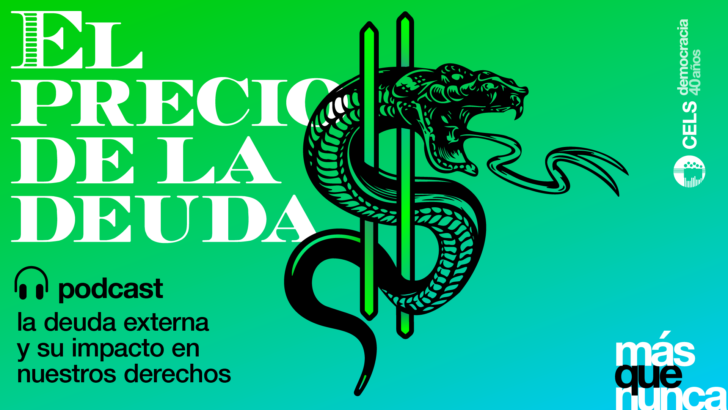Debates on external debt often revolve around technical and macroeconomic discourses, dominated by experts. This can make it challenging for many people to understand the concrete effects that the debt has on daily life and its impact on essential rights such as work, health, education, and a healthy environment.
These very dimensions are precisely what we chose to delve into within the six episodes that comprise the series “El precio de la deuda” [The price of debt]: a podcast produced by CELS, narrated by Argentine journalist Noelia Barral Grigera, with the participation of over 20 guest contributors who examine the issue of Argentina’s external debt from various perspectives. What debt entails, its scope, and why it’s crucial to realize that discussing debt repayment also implies a loss in quality of life—these are among the topics explored in episodes ranging from 15 to 25 minutes, available on the Spotify platform.
Understanding the origin of the IMF and what its interests are when it lends money to countries in crisis are key to explaining and understanding more about debt. The responsibility of governments that take on debt indiscriminately is also critical. In addition, the environmental impact of debt is another of the central issues that are part of the episodes discussed from the perspectives of the podcast guests.
In the different episodes, Ricardo Aronskind, Alejandro Bercovich, Julia Strada, Francisco Verbic, Magdalena Rúa, Noemí Brenta, Emilia Val, Verónica Gago, Laura Clérico, Andrés Chiriboga Tejada, María Julia Eliosoff, María Emilia Mamberti, Corina Rodríguez Enríquez, Dina Sánchez, Ariel Slipak, Diego Montón, Lef Nahuel, Karina Patricio Ferreira Lima, Julieta Rossi, and Julio Gambina contribute their insights on debt and analyze everything from its composition to the potential ways out of the labyrinth proposed by the foreign creditors.
“El precio de la deuda” podcast was produced with the support of Funders Organized for Rights in the Global Economy (FORGE). The episodes are available in Spanish.

